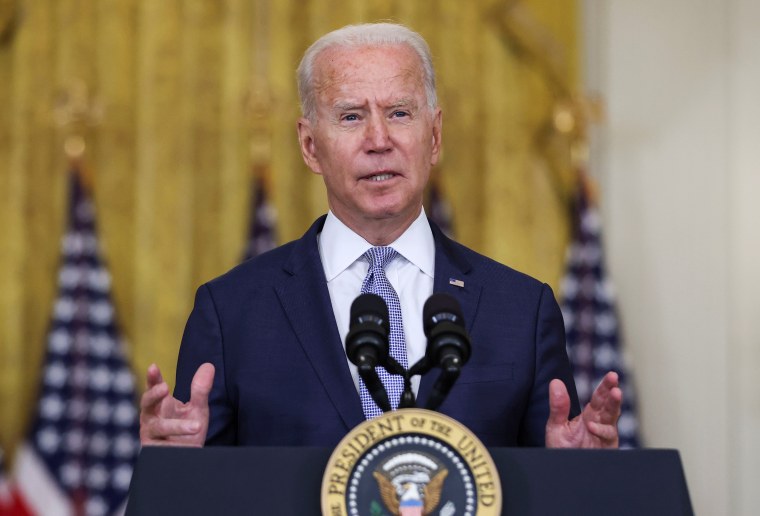More than 20 Asian American and Pacific Islander organizations called on President Joe Biden to further protect the community ahead of next week's release of the findings of an investigation into the origins of the coronavirus.
The organizations said in a letter to Biden on Thursday that when the review of the virus's source was ordered in May, many people across the country had already begun to interpret it as "validation for the so-called 'lab leak theory.'" As the 90-day investigation is set to conclude at the end of this month, the groups warned that discussions of the report could aggravate anti-Asian bias, and they urged him to "redouble your efforts to combat anti-AAPI hate and violence — to speak out and to act."
"The sad but undeniable truth is that the simple existence of that report will put our communities at risk. We recognize your Administration's legitimate interest in identifying the source of this pandemic for the purpose of preventing future outbreaks," read the letter, spearheaded by the National Council of Asian Pacific Americans and Stop AAPI Hate. "At the same time, perception matters."
Russell Jeung, a co-founder of Stop AAPI Hate, said that regardless of the results, the organizations are concerned that people could weaponize the report to spread conspiracy theories, further motivating hate incidents.
"That's why we wanted to pre-empt these attacks. We wanted to put the nation on alert and call on the president to put more substance in his stopping anti-Asian racism," Jeung said.
In the letter, the coalition — which includes the Asian Pacific American Institute for Congressional Studies, South Asian Americans Leading Together and the National Queer Asian Pacific Islander Alliance — called for a more comprehensive approach to racism against Asian Americans and Pacific Islanders, or AAPIs, including funding initiatives to help local governments and communities expand civil rights protections for AAPI communities. It also urged that information be provided in more languages so victims of violence can get trauma-informed care and culturally competent mental health services.
Jeung said that while much of the dangerous rhetoric about the virus and its racist associations with the Asian American community from officials has diminished since the last administration, aggressive anti-Chinese policies haven't. That's why the groups also demanded that Biden end the Trump-era China Initiative, a controversial effort initially aimed at countering espionage from China. It has drawn heavy criticism over several cases in which people of Asian descent, including Asian Americans, were falsely accused of crimes.
The letter said most scientists agree that the virus's initial transmission was more likely to have been through natural origins rather than from lab experiments. However, pundits and politicians have continued to use the controversial lab leak hypothesis "to scapegoat Asian Americans as somehow to blame for the pandemic." AAPI communities have already begun to see "Red Scare"-type rhetoric invoked in bias incidents, a recent Stop AAPI Hate report found.
In more than 48 percent of all hate incidents, anti-China and/or anti-immigrant rhetoric was included in at least one hateful statement, the report said. Jeung said that throughout history, entire groups of people were often discriminated against without any evidence of wrongdoing. Citing the China Initiative and the forced incarceration of Japanese Americans during World War II due to concerns that they were "disloyal" to the U.S., Jeung said, "These conspiracy theories just emerged baselessly, and people act on them."
Jeung said it's unclear whether Asian Americans can entirely avoid hate incidents, regardless of the report's conclusions, but he said it's important for Biden to be specific when discussing policy to avoid harm.
"Those blanket generalizations about Chinese as a threat have been deadly for us. ... If there's a mal-intent or a negative critique of the policy," it's important that "it doesn't extend to a negative critique of the people," Jeung said. "Beyond specifying the actions of a specific organization or government, we want that to be balanced with statements saying, 'We cannot condone anti-Asian hate.'"
